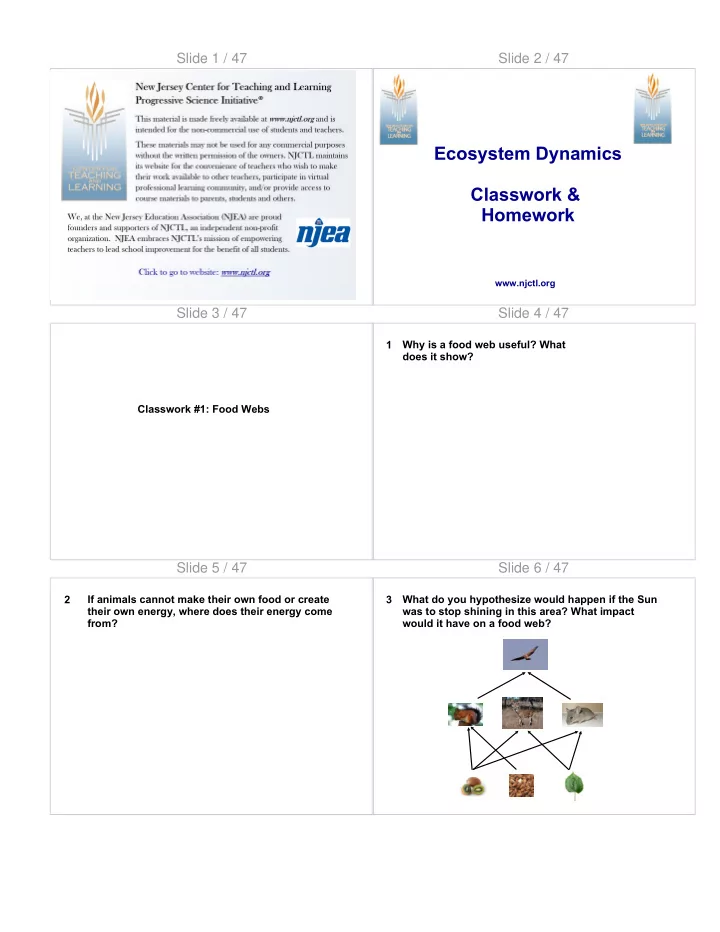

Slide 1 / 47 Slide 2 / 47 Ecosystem Dynamics Classwork & Homework www.njctl.org Slide 3 / 47 Slide 4 / 47 Why is a food web useful? What 1 does it show? Classwork #1: Food Webs Slide 5 / 47 Slide 6 / 47 2 If animals cannot make their own food or create 3 What do you hypothesize would happen if the Sun their own energy, where does their energy come was to stop shining in this area? What impact from? would it have on a food web?
Slide 7 / 47 Slide 8 / 47 4 Describe the difference between a primary 5 Correctly set up the following food web: consumer and a secondary consumer. a. Bears are secondary consumers of rabbits, deer and foxes b. Deer eat berries and leaves c. Rabbits eat berries and leaves d. Foxes eat rabbits Slide 9 / 47 Slide 10 / 47 6 What kind of food would an herbivore eat? Give an example. Homework: Food Webs Slide 11 / 47 Slide 12 / 47 8 What kind of food would an omnivore eat? 7 What kind of food would a carnivore eat? Give an example. Give an example.
Slide 13 / 47 Slide 14 / 47 9 What level of consumers are humans? 10 Create a food web of your local area. Include at least 2 producers, 2 primary consumers and 2 secondary consumers. Slide 15 / 47 Slide 16 / 47 11 Define decomposition. Classwork: Decomposers Slide 17 / 47 Slide 18 / 47 12 What are two organisms that help with 13 What effect does the growth of mushrooms have decomposition? on the surrounding environment?
Slide 19 / 47 Slide 20 / 47 14 Why is composting a positive thing to do in your 15 List three factors that impact the rate of garden? decomposition. Slide 21 / 47 Slide 22 / 47 16 What types of organisms are examples of fungi? Homework: Decomposers Slide 23 / 47 Slide 24 / 47 17 Why is decomposition important for an 18 How can you speed up the process of ecosystem? decomposition?
Slide 25 / 47 Slide 26 / 47 19 Bill is testing the effects of decomposition on two identical pieces of bread. One piece of bread is placed in an empty plastic bag. One is placed in a bag with water. One is placed in a bag with water and placed under a heat lamp. Which do you expect to rot the most? Why? Classwork: Cycles of Matter Slide 27 / 47 Slide 28 / 47 20 How do we define matter? Give two examples. 21 What are all living things primarily made up of? Slide 29 / 47 Slide 30 / 47 22 How does the matter that makes up plants 23 What is responsible for recycling dead matter? make its way to a secondary consumer?
Slide 31 / 47 Slide 32 / 47 24 What role does the environment play in the cycle of matter? Give two examples. Homework: Cycles of Matter Slide 33 / 47 Slide 34 / 47 25 What is soil composed of? 26 How does the Law of the Conservation of Mass apply to a food web? Slide 35 / 47 Slide 36 / 47 27 What are the three main elements that make up 28 What would happen if matter was not returned to the human body? Which substance makes up the soil? between 60%-75% of the human body?
Slide 37 / 47 Slide 38 / 47 29 Create a model that displays the movement of matter between plants, animals, decomposers and the environment. Classwork: Maintaining an Ecosystem Slide 39 / 47 Slide 40 / 47 30 What are the four basic needs of organisms? 31 Why are plants so important to an ecosystem? Slide 41 / 47 Slide 42 / 47 32 What negative effects does overpopulation have 33 Why is the introduction of the cane toad in on an ecosystem? Australia having negative effects on the ecosystem? What efforts are being made to stop their spread?
Slide 43 / 47 Slide 44 / 47 34 Why are ecosystems considered fragile? Homework: Maintaining an Ecosystem Slide 45 / 47 Slide 46 / 47 35 How do organisms make sure that they maintain 36 What negative effects does over-hunting have on a proper population balance? an ecosystem? Slide 47 / 47 37 What is the difference between a native species and an alien species?
Recommend
More recommend